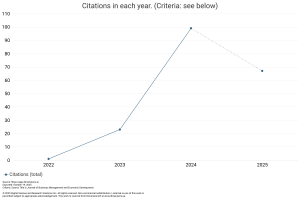Development Finance Models and Sustainable Growth of Nigeria: A Granger Causality Approach
DOI:
https://doi.org/10.59653/jbmed.v2i03.786Keywords:
Development Finance Models, Sustainable Growth, Granger Causality ApproachAbstract
One of the primary goals of policy makers is to build an economy that is relatively stable. As such, to ensure that the economy is relatively stable, policy makers embark on series of financial (economic) reforms. However, even with the concerted efforts to improve the state of the Nigerian economy, the Nigeria is still under-developed. Hence, the paper aimed at examining the effects of development finance on sustainable growth of Nigeria using the granger causality approach. The development finance measures are private sector credits, broad money supply (BMS), Interest rate volatilities, and trade openness while sustainable growth measured by RGDP. The study spanned from 1989 to 2021. The study reported that, both private credits and broad money supply bi-granger cause sustainable growth but trade openness only cause sustainable growth. However, Interest rate volatilities did not influence sustainable growth nor growth did. Hence, the paper concludes that, both private sector credits and broad money supply precedes growth just as growth precedes both private sector credits and broad money supply while trade openness is a precondition for economic growth. As such, it is imperative for the apex regulatory body to instruct Nigerian banks to give more credits to the private sector. Lastly, the efforts should be made to improve the degree to which the Nigerian economy is open to trade. Lastly, the rising high cost of borrowing should be reduced.
Downloads
References
Agbogun, O. E., & Ehiedu, V. C. (2022). Trade policy drivers and economic performance of OPEC Member States. International Journal of Academic Accounting, Finance, and Management Research, 6(8), 109-118.
Granger, C. W. J., & Newbold, P. (2014). Forecasting economic time series. Academic press. https://cir.nii.ac.jp/crid/1130282271548064256.
Iyoha, M., & Okim, A. (2017). The impact of trade on economic growth in ECOWAS countries: Evidence from panel data. CBN Journal of Applied Statistics, 8(1), 23-49.
Kerimov, P., (2021). Financial depth-economic growth nexus: implications for the Ukrainian banking sector. Banks and Bank Systems, 16(4), 72-83.
Mckinnon, R. I. (1973). Money, capital and banking. Washington D.C.: Brooklyn Institution.
Mehar, M. A. (2023). Global financial connectivity and ineffectiveness of sovereign debt: implications for business activities in South Asia. Asian Journal of Economics and Banking.
Nwadike,C.G. Ani,K.J. & Alamba, C.S. (2020). Impact of Trade Openness on Nigerian Economic Growth: An Empirical Investigation, 1970–2011, SAGE Journal https://doi.org/10.1177/0015732 519894153.
Olagunju, I. L., & Isiaka, N. A. (2021). The Economic Implication of Cash Reserve Requirement on the Profitability of Deposit Money Banks in Nigeria. Cross-Cultural Communication, 17(1), 38-47.
Oshiobugie, O.B. (2022). Trade Openness and Its Effects on the Global Competitiveness of OPEC Member Countries: Empirical Approach. International Journal of Academic Management Science Research, 6(12), 120-125
Osuji, C., Erhijakpor, A., & Oziwele, E. (2023). Financial depth index effects on economic stability of Sub-Sahara African (SSA) countries: the mediating role of government effectiveness. International Journal of Innovative Finance and Economics Research, 11(1), 79-87.
Puatwoe, J.Y., & Piabuo, S.M., (2017). Financial sector development and economic growth: evidence from Cameroon. Financial Innovation, 3(25), 1-18.
Sarker, B., & Khan, F., (2020). Nexus between foreign direct investment and economic growth in Bangladesh: An augmented autoregressive distributed lag bounds testing approach. Financial Innovation, 6(10), 1-18
Schumpeter, J. A. (1911). Theory of economic development. Cambridge: Harvard University Press
Shaw, E. (1973). Financial deepening in economic development. New York: Oxford University Press.
Sokang, K., (2018). The Impact of Foreign Direct Investment on the Economic Growth in Cambodia: Empirical Evidence. International Journal of Innovation and Economic Development, 4(5), 31-38.
Taddese Bekele, D., & Abebaw Degu, A. (2023). The effect of financial sector development on economic growth of selected sub‐Saharan Africa countries. International Journal of Finance & Economics, 28(3), 2834-2842.
Tongurai, J., & Vithessonthi, C. (2023). Financial openness and financial market development. Journal of Multinational Financial Management, 67, 100782.
Downloads
Published
How to Cite
Issue
Section
License
Copyright (c) 2024 Erhjakpor, A.E.O., Enebelli, L.A.

This work is licensed under a Creative Commons Attribution-ShareAlike 4.0 International License.
Authors who publish with this journal agree to the following terms:
- Authors retain copyright and grant the journal right of first publication with the work simultaneously licensed under a Creative Commons Attribution-ShareAlike that allows others to share the work with an acknowledgement of the work's authorship and initial publication in this journal.
- Authors are able to enter into separate, additional contractual arrangements for the non-exclusive distribution of the journal's published version of the work (e.g., post it to an institutional repository or publish it in a book), with an acknowledgement of its initial publication in this journal.
- Authors are permitted and encouraged to post their work online (e.g., in institutional repositories or on their website) prior to and during the submission process, as it can lead to productive exchanges, as well as earlier and greater citation of published work (See The Effect of Open Access).





























